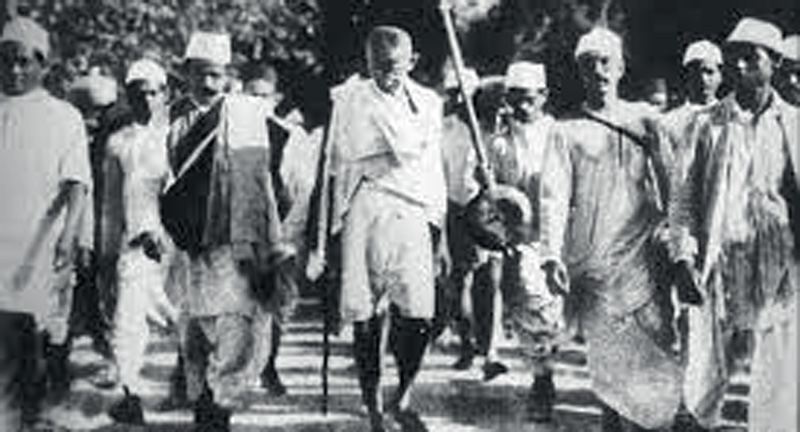Monday Feb 16, 2026
Monday Feb 16, 2026
Friday, 27 August 2021 00:01 - - {{hitsCtrl.values.hits}}

Sri Lanka can be changed only by significant mass movements involving millions of people actively, such as the civil disobedience movement known as the Salt March launched by Gandhi in India in 1930s against the salt tax imposed by the British
 Even the Catholics themselves did not show much enthusiasm except a lukewarm response to the appeal made by the Archbishop of Colombo Malcolm Cardinal Ranjith to hoist black flags on the 21st to protest against the Government's failure to do justice to the Easter Sunday tragedy. Apparently the weak approach of the Cardinal himself and the Catholic Church have contributed considerably to this situation.
Even the Catholics themselves did not show much enthusiasm except a lukewarm response to the appeal made by the Archbishop of Colombo Malcolm Cardinal Ranjith to hoist black flags on the 21st to protest against the Government's failure to do justice to the Easter Sunday tragedy. Apparently the weak approach of the Cardinal himself and the Catholic Church have contributed considerably to this situation.
Nowadays, a mere appeal is not adequate to inspire the people to participate actively in a protest like this. It is essential that the public are enlightened and induced if they are to be actively involved in mass protest movements. The results depend on the extent of the work done. The taciturnity of political movements in this respect can be seen as an indication of their fear to get involved in such activities and sectarian attitudes.
The need to do big things
The picture of Sri Lanka cannot be changed by small things but by big deeds. Sri Lanka can be changed only by significant mass movements involving millions of people actively, such as the civil disobedience movement known as the Salt March launched by Gandhi in India in 1930s against the salt tax imposed by the British.
The recent street demonstrations launched by teachers can be considered as a phenomenon that has played an important role in a specific historic moment. The statement made by the trade union leaders that they would attempt to lockdown the country if the Government failed to do so, can be considered a challenging statement though it does not fall into the category of a challenging struggle.
The black flag movement initiated by the Archbishop of Colombo Malcolm Cardinal Ranjith also could have been brought to the fore as a huge protest movement, if necessary. The Easter Sunday tragedy was an event that especially affected Catholics and Muslims. If at least these two communities were motivated to make an active protest, it could have turned into a massive protest movement that would have inspired the public.
What is the solution to the crisis?
Is the crisis facing Sri Lanka an issue that can be resolved by waiting for an election and bringing another party or alliance to power as was done in 2015? No, it is a crisis that needs to be resolved through public intervention without further delay. It is the people who have the ability and the power to take the leadership of a program of structural reform needed to overcome the crisis including the building of the nation and a new political system at this historic moment.
As the true owners of sovereignty this historic responsibility lies with the people and it must be carried out in a direct democratic manner. The old and new political parties will have the responsibility of advancing the representative democratic system that will be built after the proposed reforms.
The responsibility of planning and implementing the proposed reform program aimed at overcoming the crisis should be left to the people and not the old Legislature mainly because it is the old Legislature which should be held responsible for the failure of the country. The crisis being an outcome of their inefficient rule, they cannot be expected to possess the capacity to resolve it.
In terms of the philosophy of the Constitution, sovereignty lies with the people. It is an inalienable power. The interpretation of Article 25 of the UN Covenant on Civil and Political Rights of the UN Human Rights Committee too recognises that the people have a legitimate right to actively intervene in reshaping the political system in a crisis when it has deteriorated and collapsed. International law also recognises that the public has such a right. The people of a number of countries affected by this type of crises have effectively exercised this right. That is what ought to happen in Sri Lanka also.
The old Legislature
It is important to consider, though briefly, why the old Legislature has lost the right to lead the proposed reform programme. The leaders and representatives of the old Legislature have actively contributed to creating an environment of exacerbating ethnic, castes and religious divisions in the country which eventually has resulted in large-scale bloodshed.
Further the old Legislature had arbitrarily and persistently followed a policy of violating the Constitution, the supreme law of the country causing chaos and distortion in the system of governance. The Head of State was placed above the law so that he could have dictatorial power. Further, the members of the old Legislature have served as the partners in initiating and maintaining a corrupt system led by the President and the ruling party that allowed the plunder of public property on a large scale.
Direct democracy
It is also important to explain why the program of recreating Sri Lanka, which has reached the peak of its failure, should be spearheaded by the people themselves in a direct democratic manner.
The psyche of the people of Sri Lanka is not in a normal state; it remains in a state of distortion on account of them being compelled to live in a horrible and cruel environment persistently for a long time. The number of people killed by security forces and insurgents in the wake of unrelenting violence in the Sinhala south and Tamil north is very high. Both groups unleashed the highest level of cruelty on society at the times of violence. When a large number was physically killed, all those who survived have become more or less dead spiritually.
Being a failed state and the lack of critical intelligence of the society, two major crises facing Sri Lanka can be seen as the inevitable consequences of this situation. Even after ending the internal Civil War, there was no rectification of errors that led to the internecine riots. Instead what had happened was to change the policy of attacking Tamils temporarily, thus leaving the issue of Tamils to rot, and adopting a policy of attacking the Muslims. Catholics were the next in line for revenge.
The Easter Sunday attacks can be viewed as a ruthless attempt to kill two birds with one stone. The main objective of this sinister plan appears to have been first to launch an attack on Catholics and instigate them to attack Muslims, thereby creating a situation in which both communities would wreak havoc at the same time.
But the Catholic leaders did not allow their followers to fall into that trap. The sensible approach adopted by them averted a great catastrophe. It was Catholics and Christians who were most affected by the incident; yet it was the Sinhala Buddhists who were greatly shocked by the incident. The particular mentality developed among the Sinhala Buddhist people following the Easter attacks served as a significant factor in the election victory of this Government.
Resurrection of the dead
Despite the fact that the repression of minorities has been carried out in such a way that it would seem to the Sinhala Buddhists that it is pursued for their betterment and wellbeing, it is interesting to note that as an ethnic group the Sinhala Buddhists too are not in a privileged and advantageous position, but in a miserable state of being deceived and humiliated. In the spiritual sense, the Sinhala Buddhists are also in a state of death to a greater extent.
In order to surmount the crisis facing Sri Lanka, it is essential that the great decline in the social psyche or the state of spiritual death is overcome. The Social psyche must be animated. Critical intelligence, creativity and efficiency necessary for the well-being of society must be restored. Only then will the prevalent state of deadness that overwhelms the social psyche disappear.
The people should exercise their sovereignty vigorously for the purpose of nation building because it is the best medicine that can be used to heal the deadness in the social psyche. They must make a deep voice about the injustices that have befallen them. They must stand up to regain their lost rights. The people must exercise their sovereign power actively to liberate the country. All efforts made for that should be done in accordance with the law and in a non-violent manner. It must be turned into a great exercise aimed at building a disciplined society.
The public initiatives launched for this purpose should be turned into a greater tide of national level aimed at building the nation on a firm foundation in which discriminations based on caste differences are eradicated, harmony and co-existence between ethnic groups and religions are fostered, equal rights and human respect would be ensured for all citizens without bias or prejudice.
Adoption of a direct democratic process by the people or offering them a more appropriate democratic model for that has been the ideal methodology being used in the 21st century in recreating the nations or states that have fallen into a state of complete ruin, collapse or failure. Nicaragua, Uganda, Brazil, South Africa, Rwanda, Kenya and Nepal can be considered as countries which have failed miserably but have emerged victorious by adopting this process.
This subject is still new to Sri Lanka. The political establishment in Sri Lanka needs to study this matter seriously. In the final analysis this is the path that Sri Lanka will have to choose.